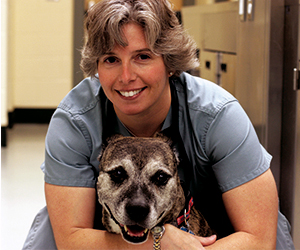
Center faculty member J. Wesley Boyd, MD, PhD, and Center research fellow Lisa Moses, DVM, recently published the first study on moral distress in North American veterinarians, published in the October 2018 issue of the Journal of Veterinary Internal Medicine.
Researchers conducted a survey of veterinarians and received 889 responses from veterinarians in the U.S. and Canada and found that most reported they had received no conflict resolution training (71%) or instruction or training in self-care (79%). Recent grads reporting more training hours in these matters; however, there were no significant differences between younger and older grads found in the amount of distress or conflict reported based on the amount of such training.
Researchers found that 32% of respondents said they “often” had conflicts with pet owners about how to proceed with care and 53% said “sometimes.” Most (68%) said they dealt with these situations by discussing with colleagues and 15% said they did nothing when these scenarios occurred. Almost half (45%) of respondents said they are sometimes asked to do something that feels wrong and 62.5% sometimes or often felt they could not “do the right thing.”
29.3% stated that they sometimes or often receive what they consider to be inappropriate requests for euthanasia, and approximately 19% of respondents said they sometimes or often acceded to these requests. 44.6% said it caused them or their staff a moderate amount of distress and 18.7% reported it caused them or their staff severe distress.
Seventy-nine percent of respondents said that they sometimes or often have had requests to provide treatment that they considered futile, and roughly half of our respondents have refused such requests.
And finally, sixty-nine percent of respondents said they felt they had moderate to severe amounts of distress as a result of not being able to provide care they thought was appropriate.
“For years my colleagues and I suffered mostly in silence with the stress of our work” said lead author Dr. Lisa Moses, a research fellow at the Center for Bioethics at Harvard Medical School and senior staff veterinarian at the MSPCA-Angell Animal Medical Center in Boston. “Our study confirmed what I suspected—namely that ethical conflict causes a lot of stress and specifically, moral distress in veterinary practice and my colleagues often don’t have the tools to deal with it”.

“As a mental health provider, as a pet owner, and as a human being our findings are very concerning,” said Dr. J. Wesley Boyd, associate professor of psychiatry and a faculty member in the Center for Bioethics at Harvard Medical School (pictured above). “Training programs for veterinarians need to include work on how to navigate emotionally fraught because our findings indicated that veterinarians routinely experience distress and can find it difficult to navigate the emotional and psychological demands of their work.”
Read the full article, “Ethical Conflict and Moral Distress in Veterinary Practice: A Survey of North American Veterinarians” in the Journal of Veterinary Internal Medicine.
Additional media coverage:
Boston Globe, October 14, 2018
WBUR Radio, Commonhealth Blog, October 15, 2018